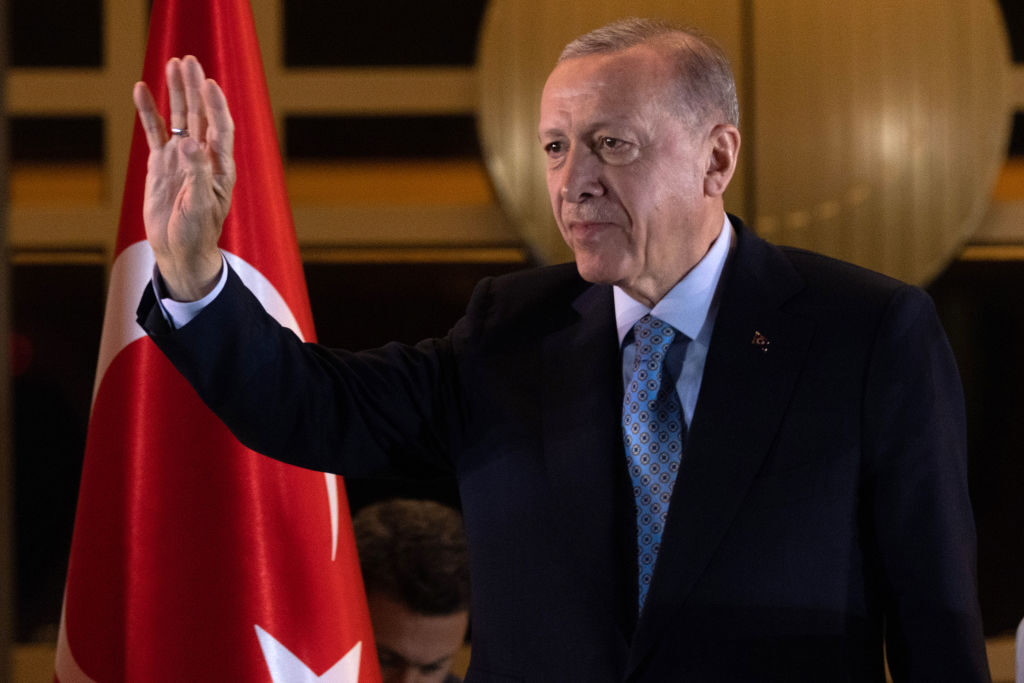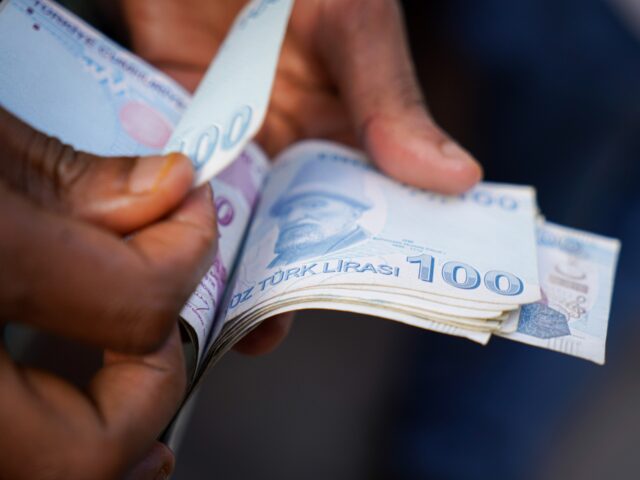Turkey’s currency, the lira, sank to a record low on Monday as markets reacted to the re-election of President Recep Tayyip Erdogan.
Erdogan’s bizarre economic policies have caused rampant inflation and declining currency reserves. Market analysts predicted he will double down on these policies and bring Turkey to the brink of fiscal collapse.
“The current setup is just not sustainable. With limited FX [foreign exchange] reserves and massively negative real interest rates, the pressure on the lira is heavy,” BlueBay Asset Management senior strategist Timothy Ash said in a Monday morning email quoted by CNBC.
Erdogan firmly believes that instead of raising interest rates to combat inflation, as most industrialized nations do, Turkey needs to lower interest rates to boost its manufacturing sector, theoretically creating enough economic growth to bring inflation down.
There is very little sign this strategy is working, as Turkish inflation is hovering around 45 percent. Erdogan claimed in his victory speech that his policies must be working because inflation was over 80 percent last summer, but economists remain unconvinced.

A customer counts out Turkish lira banknotes to pay a vendor in Ulus market in Ankara, Turkey, on Thursday, May 11, 2023. The Turkish central bank has burned through $177 billion propping up the currency since December 2021, Bloomberg Economics estimates. (Kerem Uzel/Bloomberg via Getty)
“If the Lira continues to plunge and inflation surges again due to the policy of inappropriately-low interest rates, we could see a repeat of the ‘flight to safety’ allocation to Turkish equities by local investors which moved the market sharply higher in 2022,” warned MarketVector CEO Steven Schoenfeld.
Wells Fargo emerging markets economist Brendan McKenna offered a “pessimistic” forecast for the lira, which has already lost 77 percent of its value against the dollar since 2018 and will probably hit new record lows over the coming year. The lira is currently trading at just over 20 to the dollar, but McKenna predicted it could go as low as 25-to-1.
“It’s a very bleak economic and markets outlook for Turkey,” McKenna said, predicting Erdogan will eventually try to arrest the decline by making currency swap deals with China and wealthy Gulf Arab states.
Erdogan gave himself top marks for handling the economy in his victory speech, claiming it would not be “difficult” for his administration to “eliminate the problems caused by the rise of prices and compensate for welfare losses.”
“Trust and stability. Those are the two important concepts. We will establish an economy management based on those two concepts. We are designing with a finance management team that has international reputation and an economy focused on investment and employment,” Erdogan said, disregarding the doomsday forecasts from international analysts.
Turkey’s Hurriyet Daily News found Turkish business groups more optimistic than global analysts, as they ostensibly breathe a sigh of relief now that the election drama is behind them and “uncertainties have been removed.”

President Recep Tayyip Erdogan acknowledges supporters at the presidential palace after winning reelection in a runoff on May 29, 2023 in Ankara, Turkey. (Chris McGrath/Getty Images)
“We are more hopeful about the new period. We believe we can quickly overcome the current problems with an economy management team which is expert in the production and export issues,” said Turkish Exporters’ Association president Mustafa Gultepe.
“However, I need to stress that we are going through a difficult period,” Gultepe added.
“As the business world, we will continue to work for more production, more exports and work to create more jobs after the elections,” promised Foreign Economic Relations Board chief Nail Olpak.
Al Jazeera News noted that Turkish stocks rose 3.5 percent after Erdogan declared victory, even as the lira plummeted, which suggests the domestic market is more confident in his economic vision than the international business community.
The Financial Times predicted those glimmers of optimism in the Turkish market would not last for long, as the enormous bill for Erdogan’s vote-buying spree comes due:
Pressure on the state’s diminishing resources will be increased by a string of blatant election giveaways, including changing retirement age regulations and increasing civil servants’ salaries. Its foreign currency and gold reserves tumbled $17bn in the six weeks before the first round of voting on May 14 as Erdoğan sought to prop up the economy and currency ahead of the polls, according to Financial Times calculations of official data. The state is also grappling with a near-record current account deficit.
Yet Erdoğan’s policies, coupled with his penchant for picking fights with western allies and his drift towards authoritarianism, long ago scared off foreign investors who could provide much needed hard currency. This is not sustainable. The state is running out of resources to defend the lira.
Reuters feared Erdogan’s victory, which will carry the authoritarian ruler into a third decade of power and ensure he is at the helm when the Republic of Turkey celebrates its 100th anniversary in October, will send a “sharp message” to the world that “politics is trumping sound economics.”
Turkey Election: Erdogan Favoured as Voters Head Back to Polls for Runoffhttps://t.co/AkpgdQgkeC
— Breitbart London (@BreitbartLondon) May 28, 2023
In this analysis, Erdogan persuaded his voters not to make the short-term sacrifices necessary to build a sound economic engine over the long term. In the years ahead, as Western investors continue to keep their distance, Erdogan will probably away from NATO and toward China and the Gulf for financial assistance, and political influence is likely to follow those financial arrangements.
“In an era where geopolitics is front and centre, Turkey’s election result is a warning to other leaders of nations preparing to go to the ballot box that a sound economy is no guarantee of success,” Reuters concluded.

COMMENTS
Please let us know if you're having issues with commenting.